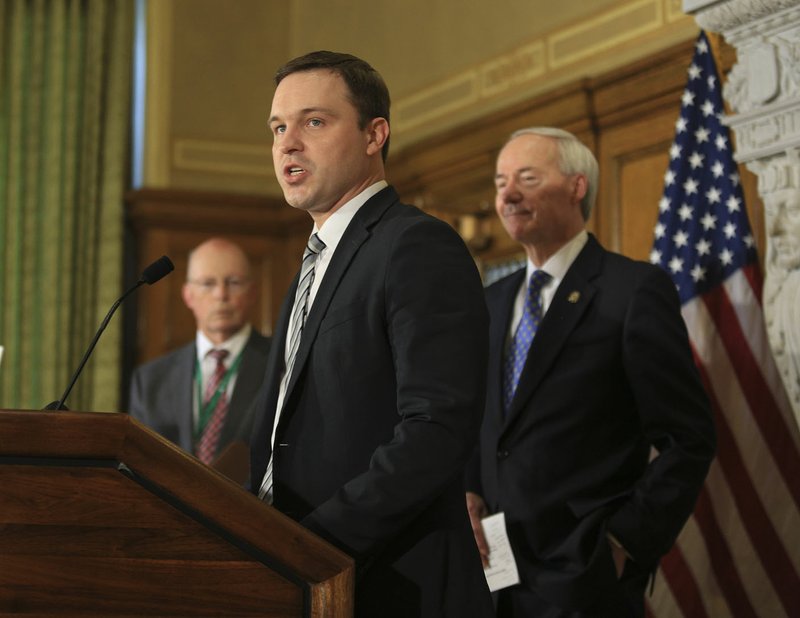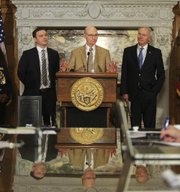Teach for America will increase its teacher numbers in Arkansas by more than 200 and expand the districts it serves to include the Little Rock School District with $6 million from the state and private donors, Gov. Asa Hutchinson announced Wednesday.
The 25-year-old organization recruits and trains recent college graduates who have degrees in fields other than education to be teachers for two years in the nation's high-poverty communities. The organization, which is currently supporting about 110 corps members in the state, has placed teachers in the state's Delta region for more than two decades. Those teachers have worked largely in Lee, Phillips, Chicot, Jefferson and Union counties.
Hutchinson said at a news conference Wednesday that he will draw $3 million from the governor's executive discretionary fund to add as many as 150 Teach for America corps members who will serve as many as 9,000 students in eastern and southern Arkansas school districts where 86 percent or more of the students qualify for free or reduced-price school meals, which is an indication of low family income.
At the same time, he said, central Arkansas businessmen -- led by Arkansas Democrat-Gazette Publisher Walter E. Hussman Jr. and Haskell L. Dickinson II of the Trinity Foundation -- have raised another $3 million to support 65 Teach for America corps members to be employed in the Little Rock district, which has not previously employed Teach for America corps members. Those teachers would serve about 4,000 students in the 24,000-student district.
The announcement of the funding comes at a time when enrollment in the state's teacher-education programs -- both traditional and nontraditional -- is in decline.
Between 2010 and 2015, the number of candidates in teacher preparation programs dropped from 8,255 to 5,258 in Arkansas. The drop is steepest in the public and private colleges of education, from 7,067 in 2010 to 3,555 in 2015. The nontraditional program numbers started at 1,188 in 2010, hit a high of 2,090 in 2013 and fell to 1,703 in 2015, according to the state Education Department numbers.
Hutchinson said he first became a fan of Teach for America about a year ago at a Grady fish fry where he met about a dozen corps members who were from all over the country and were working in the Pine Bluff School District. Another, later encounter with a former corps member who stayed in Arkansas reinforced his viewpoint.
He said he saw the potential for the program to help communities, particularly rural ones, that face extra challenges in recruiting and retaining top quality teachers.
"This is an extraordinary opportunity in central Arkansas and in south and east Arkansas to inspire a new generation of young people [and] utilize the talents of some incredible teachers," Hutchinson told the crowd of business people, lawmakers and educators -- including some of the state's current Teach for America teachers.
Teach for America provides an initial summer training program for its teachers at Delta State College in Cleveland, Miss., and the program continues to coach corps members throughout their two-year teaching commitment. The host school district pays the salary of the teacher corps member.
Applications to be a Teach for America teacher in the 2016-17 school year are available on the organization's website. They are due March 5. Applicants who can specify their state preferences must pass a Praxis teacher qualifying exam to obtain a required provisional state teacher license, which can lead to a regular teacher license over time.
Hussman, speaking on behalf of the private donors for the Little Rock district, said he also became personally familiar with and impressed by Teach for America several years ago when he assisted then-Superintendent Frank Anthony in getting corps members for the Pine Bluff School District.
He said the Little Rock project's donors, most of whom were not publicly named, live in Little Rock, have a great love for Little Rock and Arkansas, and are committed to helping those people who need help the most. They also want to make the district -- now under state control for chronically low test scores at six schools -- one of the most outstanding districts in the country.
Hussman said he's been involved in capital campaigns, big and small, for 40 years.
"I'll tell you I've never been involved in a fundraising project like this where we raised this much money this quickly," Hussman said about what he described as a "weekslong" drive. "It just shows that the people of Little Rock who are business owners really want to do everything they can to help the Little Rock schools, and they think this is a great way to do it."
Hussman thanked Little Rock School District Superintendent Baker Kurrus and Arkansas Education Commissioner Johnny Key, who serves as the school board for the state-controlled district, for welcoming the Teach for America program to the school district. The organization would not otherwise have affiliated with the district, he said.
Jared Henderson, executive director of Teach for America in Arkansas, said that the state funds will be combined with funding from the Walton Family Foundation of Bentonville to support the 150 new corps members in southern and eastern Arkansas.
In November, the Walton foundation announced it was contributing $50 million over three years to Teach for America. That included $4,757,500 to support 800 teacher corps members in Arkansas and Mississippi.
Henderson said Wednesday that his organization would approach the work in the Little Rock district with "respect and humility so we earn over time the trust of our students' families and new colleagues."
Kurrus said everything he has done in his nine months as superintendent has been geared toward supporting teachers -- in whom he has great confidence -- and students in the classroom because that is where the learning occurs.
The state's largest district employs about 2,197 teachers currently -- including about 60 who started with degrees in fields other than education. The district hires about 175 new teachers a year to fill vacancies created by resignations and retirements.
Kurrus said he hopes the corps members can fill teaching jobs in math, science and foreign languages, which are sometimes jobs that are hard to fill, particularly in some of the district's high-need schools.
"I'm hopeful we can make a big difference for our students everywhere we have Teach for America teachers and everywhere we have teachers. It is with a great deal of enthusiasm that I embrace this," Kurrus said in thanking those involved.
Willie Murdock, the superintendent of the Marianna-based Lee County School District, said her district was one of the first in the state to employ Teach for America teachers in the 1990s.
"We are so fortunate that the governor has taken it upon himself to assist us and support Teach for America," she said. "We want to get more of those teachers in our district. We have married them there. They have come back and they have stayed a long time. We want to get more."
Reaction to the expansion of the program in Arkansas was mixed.
Sen. Joyce Elliott, D-Little Rock, a retired high school English teacher, said the expansion of Teach for America is not a solution to the poor economic conditions that are at the root of a community's struggle to recruit and keep high-quality teachers.
"Nobody should fault the TFA [Teach for America] teachers," she said in an interview." They are being used to place a bandage on a problem that needs a long-range solution. Why is there an issue of getting teachers to teach in any school anywhere? If we deal with that problem, we don't have to keep putting bandages on this problem for certain kids -- minority kids and poor kids and kids in certain parts of the state.
"The very same people who are supporting this are not clamoring for Teach for America in their schools, in the schools that teach their loved ones," Elliott said. "The conditions there are such that teachers will go there and will teach. We need to create those conditions in the Mariannas and the Pine Bluffs. What if we used that $3 million from the state to figure out economic development plans for these areas so we are addressing that?"
Melanie Fox, a former Little Rock School Board member and one of the donors to the $3 million that will fund the corps members in the Little Rock district, said that her child was taught in elementary school by a former Teach for America corps member who remained in the teaching profession.
Fox also noted that the plan for providing Teach For America teachers to the Little Rock district fulfills a provision in the Little Rock district's five-year strategic plan that was adopted by the School Board several years ago.
That strategic plan called for the Little Rock district to recruit graduates from top universities in the country, including individuals with degrees in math, science, statistics, technology and foreign languages. The strategic plan called for the district to achieve that goal by partnering with talent-recruiting organizations such as Teach for America and the New Teacher Project.
Teach for America began as founder Wendy Kopp's 1999 senior thesis at Princeton University.
As of last November there were 8,600 Teach For America corps members from 830 colleges and universities teaching in 52 urban and rural regions across the country. An additional 42,000 alumni of the program work in a variety of fields to support educational excellence, the organization says.
In Arkansas, in addition to the 110 corps members this year, there are nearly 200 other organization alumni. Twenty school leaders and two former Arkansas Teachers of the Year are former members of the corps.
The national Education Week newspaper recently reported that Teach For America spends $53,000 per teacher for their recruitment, training and support. That includes a five-week summer program and then coaching throughout the two years.
A Section on 01/28/2016

